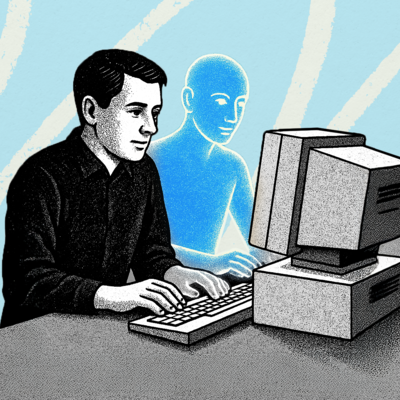.png)
Hello, and happy Sunday! By now you’ve probably read your fair share about Claude Code on Every. Do you want to learn how we use it? No coding experience required! Join Dan Shipper for a full-day beginner’s workshop on November 19 where you'll learn Claude Code from scratch. Install it on your machine, build a live project, and leave with skills you can use immediately. Early bird pricing is $1,000 (and includes an annual Every subscription)—but only until October 23.—Kate Lee
Knowledge base
"Seeing Business Like a Language Model" by Dan Shipper/Chain of Thought: Dan argues that successful founders don't follow universal rules—say, Porter’s Five Forces; they develop gut-level intuition through repeated exposure to real contexts, learning to predict the next right move the way language models predict the next token. Read this if you want to stop chasing frameworks and start building authentic business instincts.
"Our New Incubation Raised $3.6 Million to Teach AIs to Play Games" by Dan Shipper/Chain of Thought: Every's AI Diplomacy project went viral, with 60,000 readers and 50,000 Twitch viewers watching frontier models lie, cheat, and betray each other—and now it's spinning out as Good Start Labs with serious funding from General Catalyst and Inovia. Read this to see how playing games could be the secret sauce for training better AI models.
"How Playing Games Is Making AI Smarter" by Rhea Purohit/AI & I: Every’s head of AI training Alex Duffy is out to prove video game haters wrong with Good Start Labs. Watch Dan Shipper's interview with Alex to see why current AI benchmarks are fundamentally broken and how games like Diplomacy offer a more dynamic way to evaluate and train language models. 🎧 🖥 Listen on Spotify or Apple Podcasts, or watch on X or YouTube.
"Anthropic Cooked on Claude Haiku 4.5" by Dan Shipper, Kieran Klaassen and Alex Duffy/Vibe Check: Anthropic just dropped Haiku 4.5, and it's the AI equivalent of getting a luxury car at Toyota prices. The team got early access and discovered it performs nearly as well as Sonnet 4.5 while being three times cheaper. Read this if you're a developer looking to upgrade your AI applications without bankrupting your startup.
"A Founder's Guide to Finding a Great Name" by Willem Van Lancker/Thesis: Willem Van Lancker has spent a decade helping startups find names that, well, actually land—such as The Browser Company, Imprint, and Keeps. Now he's distilled this dark art into a process any founder can complete in a single afternoon using two new tools available to Every subscribers. Read this if you're tired of staring at whiteboards covered in terrible name ideas.
From Every Studio
Spiral launches Tuesday: An AI writer with taste
Spiral goes public on Tuesday as a complete reimagining of Every's AI writing tool. General manager Danny Aziz rebuilt Spiral from the ground up around a single promise: taste. Instead of generic AI outputs, Spiral interviews you about your idea, learns your style, and helps you draft in formats from X posts to essays. Every subscribers can try it before the big launch at spiral.computer.
Cora gets 44% faster with Haiku 4.5
Cora upgraded to Anthropic's new Haiku 4.5 model, making the inbox assistant significantly faster while maintaining accuracy. Kieran Klaassen, general manager of Cora, tested the upgrade on queries like, "How much did I spend on Ubers in Guadalajara?" and "What was my first ever email?" Cora now responds in 19.7 seconds versus 28.3 seconds. The model also brings better understanding of complex requests and improved context awareness for follow-up questions. The upgrade is live for all Cora users.
Sparkle adds content-based organization
Sparkle now organizes files by what's inside them, not just by name or date. Tell Sparkle to gather "all my Monologue-related files," and it scans filenames and document contents to create a dedicated folder, whether you're collecting DMG files, screenshots, or notes. The feature also adds long-requested subfolder organization and an “ignore” list for files you don't want touched. Sparkle general manager Yash Poojary is polishing the interface this week for an internal demo before wider release.
Monologue launches Teams and cuts latency in half
Monologue launched team accounts this week with self-serve onboarding at teams.monologue.to. Now you can create an organization, invite members, and manage seats with zero setup calls. Naveen Naidu also shipped major performance improvements: Transcription latency for audio over 60 seconds dropped by 50 percent, and Monologue now handles up to 1.5-hour recordings, transcribing them in just 15 seconds.
Alignment
The unconscious hand, relocated. I've been doing art therapy for about a year now, trying to paint the anxiety that's followed me like a shadow since I was 13. It took some getting used to, but now I feel like there's a magical moment in each session when my hand releases my unconscious onto the drawing pad. What I can't speak, I suddenly see—and for those of us who struggle to put our inner turmoil into words, this can be very therapeutic.
Which is why I've wondered whether AI can play a role in this process of unconscious expression, or whether it would suppress the magic that makes art therapy work.
It turns out there’s some recent research on this subject. Earlier this year, researchers at the University of Edinburgh published a systematic review of AI in art therapy. Another study tested "DeepThInk"—an AI that modifies your artwork in real time as you paint digitally.
From the findings there appears to be this strange push and pull with AI art. When it churns out polished masterpieces in seconds, people feel disconnected from the process. This makes sense to me because the instant polish of AI-generated work shortcuts that frustrating but necessary challenge of trying to externalize something that resists easy expression. It’s like trying to skip to the end of a difficult conversation without working through the middle.
However, what’s particularly interesting is that when people gave the AI fragmented emotional prompts—"drowning blue spirals angry mother"—they were able to tap directly into unconscious patterns and associations that they may not have been able to express with their own free hand. Researchers found that this very unpredictability "created space for exploration and creativity," making it especially valuable for people working through issues of control.
For someone like me who uses art therapy to externalize anxiety, this could mean having two tools instead of one. Sometimes anxiety manifests physically (tight chest, racing thoughts) and calls for the release of physical art making. Other times it's cognitive loops that need a different outlet—those fragmented word prompts that AI can transform into something visual I couldn't have consciously designed.
Although stronger research needs to be done in this area, what's becoming clear is that our unconscious will always find ways to speak—whether through charcoal on paper or pixels on screens. I think as our tools evolve, so too will the languages through which our deeper selves seek to be known.—Ashwin Sharma
That’s all for this week! Be sure to follow Every on X at @every and on LinkedIn.
We build AI tools for readers like you. Write brilliantly with Spiral. Organize files automatically with Sparkle. Deliver yourself from email with Cora. Dictate effortlessly with Monologue.
We also do AI training, adoption, and innovation for companies. Work with us to bring AI into your organization.
Get paid for sharing Every with your friends. Join our referral program.
The Only Subscription
You Need to
Stay at the
Edge of AI
The essential toolkit for those shaping the future
"This might be the best value you
can get from an AI subscription."
- Jay S.
Join 100,000+ leaders, builders, and innovators

Email address
Already have an account? Sign in
What is included in a subscription?
Daily insights from AI pioneers + early access to powerful AI tools








.png)
Comments
Don't have an account? Sign up!
I've played some art related games, with varying success/results, with Claude... Like getting Claude to try my "Blind drop" paper shapes method of deriving art. And I've challenged Claude to step out of the usual "most probable" answer, to report what else it passed on the way, what was discarded in the drive to "the answer." But I hadn't taken the next step and gotten into expression of my subconscious. I do this with drawing with my non-dominant hand - and I grokked the approach you describe in the post (your material approach for anxiety management/exploration AND the AI possibilities). I will be playing with that soon. But one caution rang out of the landscape you were painting for me in your post. I find that AI can, indeed, suggest things that resonate with me, and seem to come from within as well as from the ether. I wonder, though, if they are resonating because I feel them, too - they're aligned with something I haven't faced or considered, or if they resonate for other reasons, and I might be short-circuiting my subconscious exploration by accepting them as "mine" prematurely. I'm reminded of Richard Diebenkorn's rule (for painting) that was about not letting the abstract become concrete too soon - living long enough with the ambiguity to get to the deeper and better path. Would AI take us deeper, or reinforce our existing tendency to take the shallower answer (which, for me, is a cover my internal "managers" use to keep me away from the hottest topics)? I will be watching this closely.
Keep up the terrific posts - I am right on the edge of subscribing...